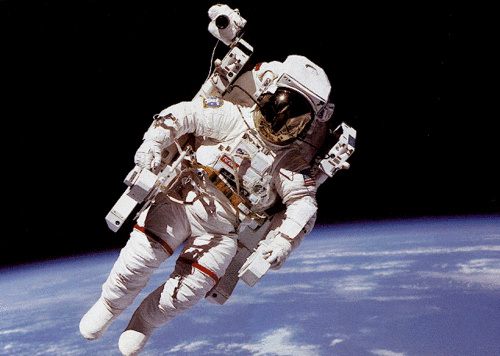 Living in this micro-gravity environment causes the human body to change because it isn't working against the force of gravity. According to Phil Carvil, a researcher on the topic of human bodies in space, "Your muscles have evolved to cope day to day with gravity on Earth, but in space you don't use them as much, so your body is thinking ‘why do I need this?’ and your muscles will deteriorate. Without the stresses and impact forces needed to maintain muscle and bone, you lose up to 20% of muscle mass each month, especially in the lower muscles – the back of the legs, the calves, and the spinal muscles."
Living in this micro-gravity environment causes the human body to change because it isn't working against the force of gravity. According to Phil Carvil, a researcher on the topic of human bodies in space, "Your muscles have evolved to cope day to day with gravity on Earth, but in space you don't use them as much, so your body is thinking ‘why do I need this?’ and your muscles will deteriorate. Without the stresses and impact forces needed to maintain muscle and bone, you lose up to 20% of muscle mass each month, especially in the lower muscles – the back of the legs, the calves, and the spinal muscles."Bones lose about 1% of tissue each month in space because of the smaller loads placed on them. The spine also responds to not being constantly pushed down by gravity, and the body can extend up to 70mm. This can be good if you always wanted to be taller, but can cause back pain.
Looking for a solution to these problems, astronauts try to mitigate these negative effects on the ISS by exercising. "Physical training is something astronauts do on a daily basis in space for two hours a day. It's a mixture of cardiovascular and resistance exercises, and that helps to maintain fitness and stimulus on the heart, muscles and bones," Phil says. Currently, new ideas are also being tested, including a skinsuit which uses stretchy material to compresses the body in a similar way to Earth's gravity.
In the end, for a mission to Mars, you need to be able to function once you get there. "The gravity on Mars is one third of the gravity on Earth,” says Stefan Schneider, from the Institute of Movement and Neuroscience at the German Sport University, Cologne, who has been looking at the impacts of simulated space isolation. “It’s not so much about muscles and good bones – your weight is a third of what it would be on Earth. This is something we need to prepare for using specific entrance training programs to keep people fit and able to perform their tasks on Mars."

No comments:
Post a Comment